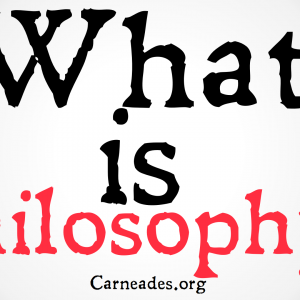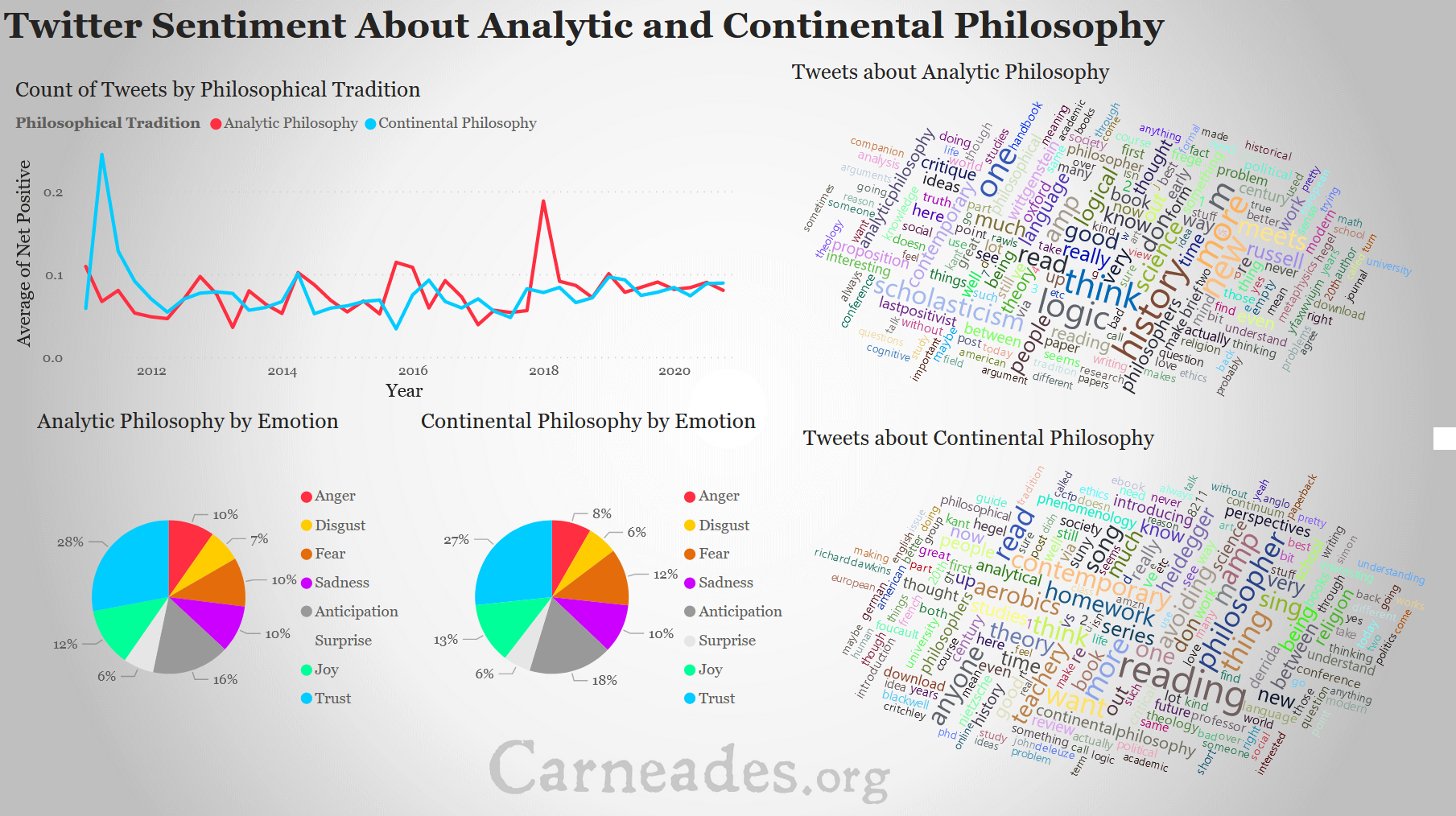The debate between analytic and continental philosophy has raged for decades, but did you ever wonder who was winning? Would Russell or Hegel get you more retweets? What words and concepts do the denizens of Twitter associate with each tradition? In this post we look at Twitter’s perceptions of Analytic and Continental philosophy to see if we can glean any sense of which philosophical tradition the Twitterverse is more amenable to. If you need background on the analytic/continental divide, here’s a great video primer.
Methods
Before digging into the results, here’s a quick primer on how we are doing this. The first step in the process is to gather the data. This is done by scraping every tweet from the last 10 years that featured the exact phrase “analytic philosophy” or “continental philosophy” and then splitting them into two datasets (33,105 tweets). Next we run some automated text analysis on the data. Specifically, in this case we are doing basic dictionary sentiment analysis, identifying the words in the tweets with emotional content. These words are divided into negative emotions and positive emotions. Words are also coded with any number of 8 specific emotions: anger, disgust, fear, sadness, anticipation, surprise, joy, and trust. The dictionary used is the NRC Emotion Lexicon (see below for citation). Here’s a video on the basics:
Results
The Power BI visualization below showcases the results of these analyses (the full screen button in the corner makes viewing easier). As you can see from the first page, analytic and continental philosophy have gotten about the same amount of tweets for the last 10 years. Analytic philosophy has a few outliers where it has gotten many more tweets, and has outpaced continental philosophy in 2020. Continental philosophy has fewer outlier peaks, and we much more prominent compared to analytic philosophy in 2011 than it is now.
Until 2018, tweets about analytic philosophy and continental philosophy were about equally likely to get “liked” or “retweeted” by someone on Twitter. But after that analytic philosophy has had something of a lead in both likes and retweets. Overall tweets about continental philosophy have been more likely to be quoted, particularly from 2016 to 2019. However these results just give us a sense of which subjects are getting traction, they don’t tell us how people feel about them (more retweets for analytic philosophy might be driven by people retweeting posts that deride and insult analytic philosophy). For that we must turn to the second page.
Moving to the second page, we can see that the overall sentiment about analytic and continental philosophy is largely the same. If we take an average of the positivity of words (where positive words are coded as 1 and negative words are coded as -1), we can see that both analytic and continental philosophy have a net positive average, indicating more positive sentiment about them than negative. Over time they are generally at similar levels of positivity, with a spike in positivity for continental philosophy in 2011 and a spike in positivity for analytic philosophy in 2018. Clicking on the line chart filters the other charts to that particular date and con show us the top words for analytic philosophy that were trending during the 2018 spike were “propositional logic” and words with a strong association with trust.
The specific emotions associated with each tradition are mostly identical. Analytic philosophy inspired slightly more anger, disgust, and trust, while continental philosophy inspired slightly more fear, anticipation, and joy. Looking to the word clouds (which have “analytic”, “continental”, and “philosophy” filtered out), we can see that analytic philosophy is most strongly associated with logic, history, and thinking, while continental philosophy is strongly associated with contemporary philosophers and reading. As one might expect, Russell and Wittgenstein are the most prominent philosophers in the analytic cloud, while Heidegger is the most prominent in continental cloud. Science and religion can be found in both clouds, but science is more prominent in the analytic cloud, while religion is more prominent in the continental one. Check out the video below for a step by step walk-though of these conclusions and how to use the visualizations.
Conclusions
Based on this analysis, it appears that, while analytic philosophy has seen more tweets and interest in the last few years, the sentiments expressed about it have not changed, and are largely in line with those expressed about continental philosophy. That said, we can pick out particular moments in time where one discipline had a larger amount of positive or negative tweets, possibly related to particular events at that time. Overall more people are tweeting about both analytic and continental philosophy, though this is likely due in part to Twitter’s user base approximately tripling in the last decade.
NRC Emotion Lexicon: association of words with eight emotions (anger, fear, anticipation, trust, surprise, sadness, joy, and disgust) and two sentiments (negative and positive) manually annotated on Amazon’s Mechanical Turk. Available in 105 different languages. Version: 0.92 Number of terms: 14,182 unigrams (words), ~25,000 word senses Association scores: binary (associated or not) Creators: Saif M. Mohammad and Peter D. Turney


